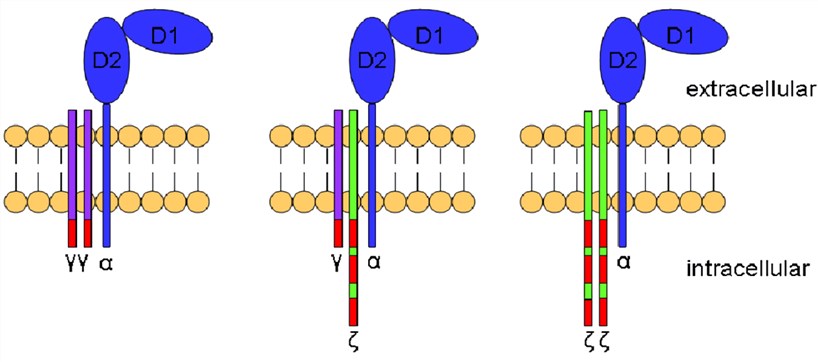Creative Biolabs is a world-leading service provider of application-specific antibody development. Here, we introduce our in vitro diagnostic (IVD) antibody development and immunoassay development services targeting FcγRIII. Our state-of-the-art technologies ensure that our clients receive high-quality, stable, flexible, and cost-effective products and services.
Introduction of Fc-γ RIII
Fc-γ Receptor III (FcγRIII), also known as CD16, is a transmembrane protein encoded by the human FCGR3 gene. Its full name is low affinity immunoglobulin gamma Fc region receptor III, which belongs to Fc γ receptors in humans. FcγRIII is a cluster of differentiation molecule found on the surface of natural killer cells, neutrophil polymorphonuclear leukocytes, monocytes, and macrophages. FcγRIII is an Ig superfamily glycoprotein has two different isoforms in human, FcγRIIIa (CD16a) and FcγRIIIb (CD16b), which have 96% sequence similarity in the extracellular immunoglobulin binding regions. As the most well-researched membrane receptor implicated in triggering lysis by NK cells, FcγRIII is a molecule of the immunoglobulin superfamily (IgSF) involved in antibody-dependent cellular cytotoxicity (ADCC).
FcγRIIIa is mainly expressed on NK cells, macrophages, activated monocytes, mast cells serving as a transmembrane receptor, while FcγRIIIb is only expressed on neutrophils and activated eosinophils. But, FcγRIIIb is the only Fc receptor anchored to the cell membrane by a glycosyl-phosphatidylinositol linker, and also plays a significant role in triggering calcium mobilization and neutrophil degranulation. Both FcγRIIIa and FcγRIIIb are able to bind to IgG and mediates phagocytosis or ADCC. They are involved in signal transduction, degranulation, phagocytosis, and oxidative burst, allowing neutrophils to clear opsonized pathogens. FcγRIII is often applied for the clinic as an additional marker to reliably identify different subsets of human immune cells. In addition, FcγRIII is able to mediate the direct killing of some virally infected and cancer cells without antibodies.
 Fig.1 Structure of Fc-γ RIII. (Aicheler, 2013)
Fig.1 Structure of Fc-γ RIII. (Aicheler, 2013)
Fc-γ RIII Marker of Sepsis Prognosis
Neutrophils play a central role in the inflammatory response in sepsis. In sepsis, neutrophils are strongly activated and prepared to kill microorganisms, but they also cause severe damage to surrounding tissues by releasing toxic lysosomal enzymes and oxygen radicals. Research showed that soluble Fc-γ RIII levels were elevated while soluble L-selectin levels were moderately decreased in sepsis patients compared with healthy controls. Moreover, CD16/32 mAb-induced Fc-γ RIII inhibition increased the survival of mice with high-grade sepsis, which might result from the concomitant suppression of tumor necrosis factor α and interleukin 1β as well as the enhancement of monocyte phagocytosis. It was suggested that concentrations of soluble Fc-γ RIII in the plasma, a marker of the total body mass of neutrophils, could be a useful marker for disease severity of sepsis.
Features of IVD Antibody Development Services
To aid in the prognosis and diagnosis of sepsis, Creative Biolabs offers an extensive range of IVD antibody development services against Fc-γ RIII antigens to measure its levels clinically. The features of our services include:
- Expertise: expert in the development of antibodies for different immunoassays (e.g., ELISA, immunohistochemistry, Western blot, immunochromatography assay).
- Experience: years of experience in the IVD field with the completion of numerous IVD-related projects.
- Efficiency: fast turnaround time and competitive pricing.
- Facility: fully equipped facility to perform antigen & antibody conjugation, protein characterization and purification.
Creative Biolabs provides IVD antibody development services against an extensive range of sepsis biomarkers in addition to Fc-γ RIII. During antibody development, we work hand in hand with you and your team to ensure project goals and timelines are being met. Contact us to discuss your projects and experience the great value of our expert services.
Reference
- Aicheler R J, et al. (2013). “Potential for Natural Killer Cell-Mediated Antibody-Dependent Cellular Cytotoxicity for Control of Human Cytomegalovirus.” Antibodies. 2(4): 617-635.
For Research Use Only.